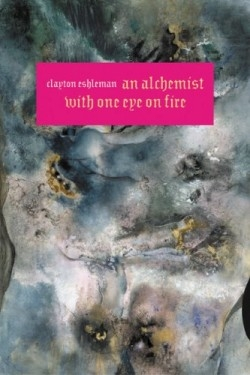An Alchemist With One Eye on Fire
If readers want to escape from poetry bound in orderly imagery, fed by a clean narrative line with a tidy epiphany at the end, then this new collection is for them. These poems, in the author’s signature style, are imagistically wild, narratively playful, downright brazen in the use of sound, and seriously engaged in the unconscious landscape that shapes behavior, makes artists, and both energizes and dehumanizes existence.
Eshleman evolved his distinctive voice and views in the sixties and seventies when he began the explorations that led to more than two dozen major works as writer, translator, and editor. His poetry springs from a rich engagement with an interior life (often based on dreams), deep explorations of a world literature that is both experimental in style and articulate of humankind’s inner drives, and a wide range of historical views and studies, particularly primitive art.
In 1979, Eshleman (with Jose Rubia Barcia) won the National Book Award for the first comprehensive translations of the late Cesar Vallejo’s Peruvian poetry. He has continued to translate important and often overlooked writers while simultaneously establishing his reputation as a poet who explicates language and thought through the individual’s interaction with deep imagery of the subconscious, “other” consciousness, parallel consciousness, or “consciousness as the hump of a subconscious back” (“A Ferocious Fold”). In one of the early poems, the voice of a lost friend, the painter Nora Jaffe, speaks to him through a “spiritual gate.”
A later poem, “Nora’s Transmission,” develops her voice to attack the limitations of the “senses five English,” and breaks into alternative language, leading to the idea informing much of his work: “no word is meaningless, each sound tumbles, / a depth charge, through the creative wiring.” Many of his poems, directly or indirectly, explore the nature of imagination and celebrate the “I”s unpredictability and perversity. He writes, “Imagination has never met a non-love it did not love, / or a wall with which it did not become engaged” (“In Life in the Folds”).
In Eshleman’s work, readers will find a unique and sometimes perilous vision, one that turns on its head whatever is the given or the norm. The poetry rises from a mind inspired by so many cultures that Eshleman is invariably difficult but inevitably satisfying to that reader who wants to be engaged in the spaces where the primal meets the political, the impulse meets the exotic. His poetry is often challenging, but readers will find he uses precise and contradictory language to connect the often unacknowledged, but sometimes luminous dots of who we are.
Reviewed by
Anne-Marie Oomen
Disclosure: This article is not an endorsement, but a review. The publisher of this book provided free copies of the book to have their book reviewed by a professional reviewer. No fee was paid by the publisher for this review. Foreword Reviews only recommends books that we love. Foreword Magazine, Inc. is disclosing this in accordance with the Federal Trade Commission’s 16 CFR, Part 255.

